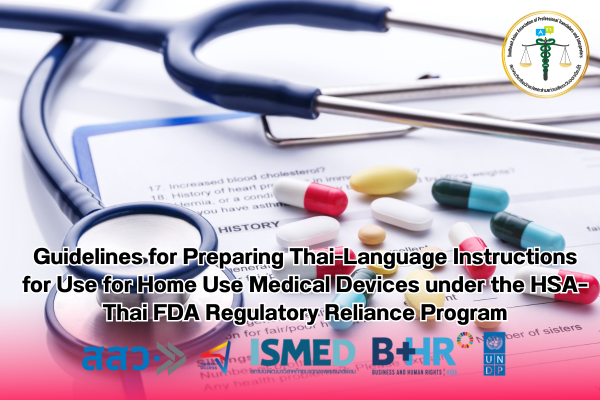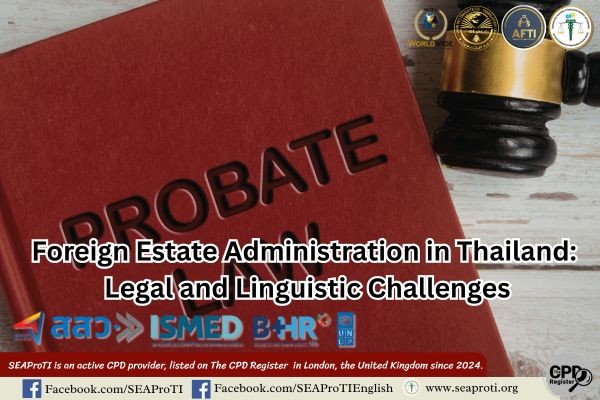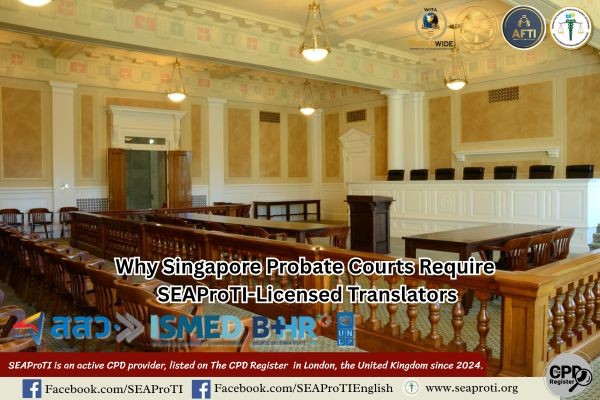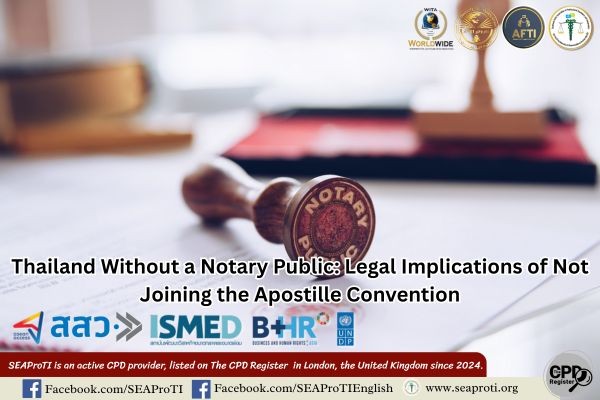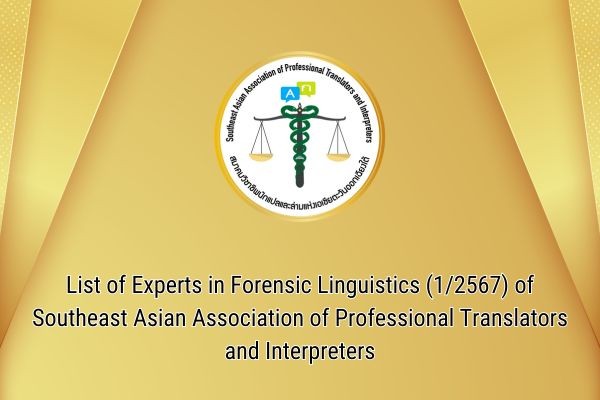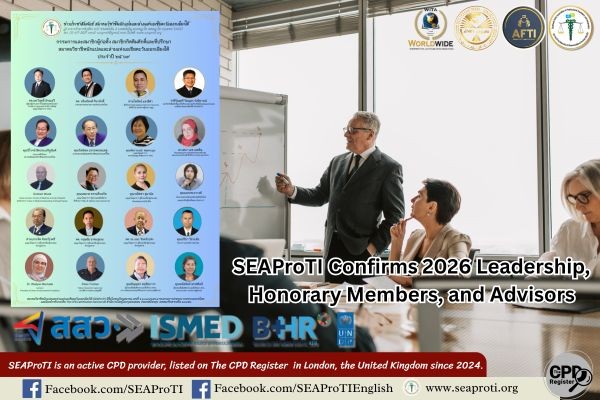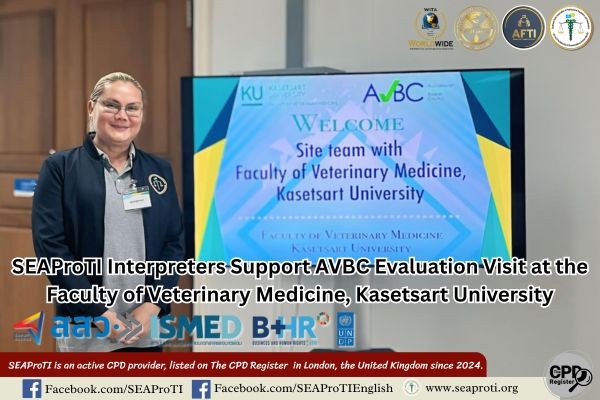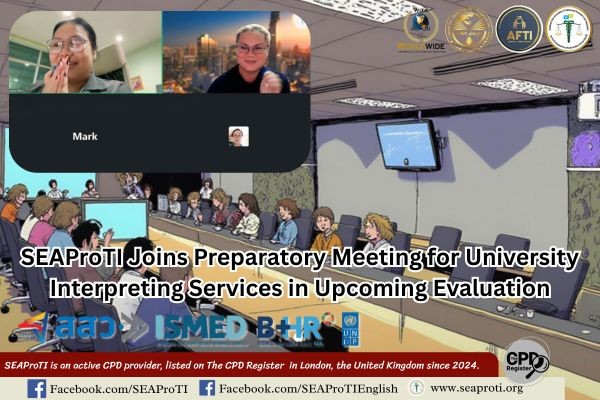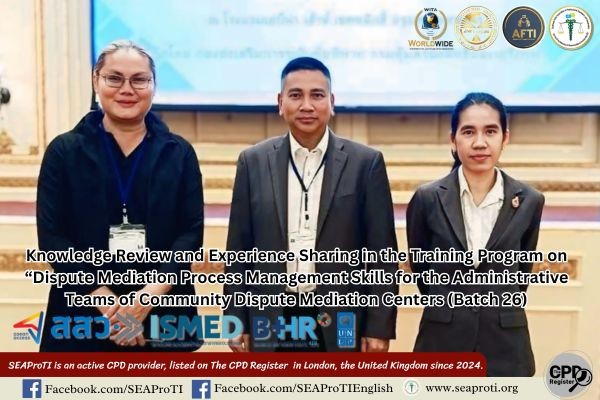Section 112 Cases and the Use of Language Experts: Risks from the Absence of Forensic Linguistics in the Justice System
A Case Study on Section 112 – Computer Crime Act Involving Thaksin Shinawatra
Author: Wanitcha Sumanat, President of the Southeast Asian Association of Professional Translators and Interpreters (SEAProTI)
Date: 23 August 2025, Bangkok
Section 112 of the Thai Criminal Code, commonly referred to as the lèse-majesté law, has been a subject of significant domestic and international debate due to its direct connection with the monarchy, national security, and freedom of expression. One of the most closely watched cases involved former prime minister Thaksin Shinawatra, who was charged under Section 112 and the Computer Crime Act following an interview he gave to a South Korean media outlet in 2015, parts of which were disseminated online in video form.
The prosecution argued that Thaksin’s use of the pronoun “he” could be interpreted as referring to the King. However, the Criminal Court acquitted Thaksin, reasoning that the statement did not explicitly identify the King. Furthermore, the testimony of the prosecution’s language experts lacked neutrality and failed to apply principles of forensic linguistics, thereby rendering their analysis insufficiently credible as evidence.
This article examines why the reliance on language experts without forensic linguistic expertise can undermine justice. It uses Thaksin’s case as a case study to illustrate two main issues: the broad meaning of pronouns such as “he” in linguistic analysis, and the problem of bias in expert testimony.
Overview of the Thaksin Case: Section 112 and the Computer Crime Act
In this case, the prosecution charged Thaksin under Section 112 and the Computer Crime Act, claiming that his interview contained defamatory remarks against the monarchy. However, the Court emphasized that the video submitted as evidence was an excerpt rather than the full interview, and thus could not provide a complete understanding of the meaning and context of Thaksin’s statements.
The Court also referred to the Oxford Dictionary in interpreting the wording at issue and concluded that the meanings advanced by the prosecution did not specifically refer to the King. Without this direct identification, the external elements of Section 112 could not be satisfied.
The Broad Meaning of Pronouns: The Case of “He”
One of the central disputes was Thaksin’s use of the pronoun “he” during the interview. Linguistically, “he” is a third-person pronoun with a broad referential scope, potentially denoting a single individual or a group of individuals.
When considered in context, Thaksin’s statements also mentioned the Privy Council, the military, and palace officials. This contextual environment rendered the pronoun “he” ambiguous, making it impossible to conclude that it referred solely and specifically to the King. To interpret “he” directly as a reference to the monarch would therefore exceed the natural boundaries of linguistic meaning.
From a forensic linguistic perspective, the analysis of such pronouns requires the application of Discourse Analysis to determine referentiality within the text. Mere literal translation or subjective interpretation is insufficient for evidentiary purposes (Coulthard & Johnson, 2010).
Prosecution Witnesses and the Problem of Bias
Another issue raised by the Court was the credibility of the prosecution witnesses, particularly the language experts. These experts asserted that “he” referred to the King. However, the Court noted that these witnesses had previously participated in anti-Thaksin political demonstrations, raising concerns of bias against the defendant.
According to legal principles, testimony from biased witnesses must be treated with caution. The Court therefore rejected the notion that a reasonable person (vinyuchon in Thai legal terminology) would interpret the statement as the witnesses had claimed. This demonstrates that if experts cannot maintain neutrality or base their opinions on verifiable scholarly methods, their testimony lacks legal weight.
Negative Impacts of Using Non-Forensic Language Experts
1. Non-scientific interpretations
Without forensic linguistic expertise, expert analysis becomes merely subjective opinion, which cannot serve as reliable evidence in criminal proceedings.
2. Injustice to the defendant
If courts were to accept biased or unscientific expert opinions, defendants could be convicted without sufficient evidentiary support. This would violate the principle of the presumption of innocence, which mandates that defendants are considered innocent until proven guilty beyond reasonable doubt (Roberts & Zuckerman, 2010).
3. Damage to the credibility of the justice system
The use of language experts lacking forensic linguistic standards risks undermining public trust in the judiciary. Such practices could be perceived as politically motivated rather than genuinely aimed at discovering the truth.
The Importance of Forensic Linguistics in Criminal Trials
Forensic linguistics is essential in criminal trials involving language and communication. It ensures that:
- Analyses are conducted using scholarly and verifiable methods, rather than personal belief.
- Context, pragmatics, and speaker intent are considered, beyond dictionary-based interpretation.
- Courts receive neutral and objective information to guide adjudication.
The use of Discourse Analysis, Pragmatics, and Speech Act Theory enables courts to determine whether statements constitute political commentary, factual description, or unlawful defamation under Section 112.
Lessons from the Thaksin Case
The Thaksin case underscores several lessons for the Thai justice system:
- Pronouns with broad referential scope, such as “he,” cannot be conclusively interpreted as referring to the King.
- Biased expert witnesses should not serve as decisive evidence, as their opinions undermine impartial adjudication.
- Courts must rely on forensic linguistic frameworks rather than general linguistic expertise or subjective interpretations to ensure fair trials.
Conclusion
The case of Section 112 and the Computer Crime Act involving Thaksin Shinawatra clearly illustrates the risks of relying on language experts who lack forensic linguistic expertise. The misinterpretation of ambiguous language, the bias of prosecution witnesses, and the absence of scientific methodology all threaten the fairness of criminal proceedings.
For Thailand’s justice system to maintain legitimacy and uphold defendants’ rights, it is imperative that only forensic linguistics-trained experts be admitted to analyze language evidence in criminal trials. This ensures that legal interpretations rest on academic rigor, transparency, and fairness—cornerstones of the rule of law.
References
- Coulthard, M., & Johnson, A. (2010). An Introduction to Forensic Linguistics: Language in Evidence. Routledge.
- Gibbons, J. (2003). Forensic Linguistics: An Introduction to Language in the Justice System. Blackwell.
- Roberts, P., & Zuckerman, A. (2010). Criminal Evidence. Oxford University Press.
- Summary of the Court’s Judgment in the Case of Thaksin Shinawatra on Charges under Section 112 of the Thai Criminal Code (Defaming, Insulting, or Threatening the King) (Read here)
* About SEAProTI Certified Translators, Translation Certifiers, and Certified Interpreters
The Southeast Asian Association of Professional Translators and Interpreters (SEAProTI) has formally established criteria for the registration of “Certified Translators,” “Translation Certification Providers,” and “Certified Interpreters.” These provisions are codified under Chapters 9 and 10 of the Royal Gazette, published by the Secretariat of the Cabinet, Office of the Prime Minister of the Kingdom of Thailand, dated 25 July 2024, Vol. 141, Part 66 Ngor, p. 100. The Royal Thai Government Gazette
** The Council of State of Thailand has proposed enacting a Royal Decree authorizing registered translators, along with translation certifiers recognized by professional associations or accredited language institutions, to certify translations. (Letter to SEAProTI dated 28 April 2025)
*** SEAProTI is the first professional association in Thailand and Southeast Asia to establish a certification system for translators, translation certifiers, and interpreters.
Head Office: Baan Ratchakru Building, No. 33, Room 402, Soi Phaholyothin 5, Phaholyothin Road, Phaya Thai Subdistrict, Phaya Thai District, Bangkok 10400, Thailand. Email: hello@seaproti.com Tel.: (+66) 2-114-3128 (Office hours: Monday–Friday, 09:00–17:00)
คดีมาตรา 112 และการใช้ผู้เชี่ยวชาญด้านภาษา: ความเสี่ยงจากการขาดนิติภาษาศาสตร์ในกระบวนการยุติธรรม
กรณีศึกษา มาตรา 112 – พ.ร.บ. คอมพิวเตอร์ ของคุณทักษิณ ชินวัตร
ผู้แต่ง วณิชชา สุมานัส นายกสมาคมวิชาชีพนักแปลและล่ามแห่งเอเชียตะวันออกเฉียงใต้
23 สิงหาคม 2568, กรุงเทพมหานคร – กฎหมายอาญามาตรา 112 ของประเทศไทย หรือที่เรียกกันทั่วไปว่า “กฎหมายหมิ่นพระบรมเดชานุภาพ” เป็นกฎหมายที่อยู่ในความสนใจของสังคมไทยและนานาชาติ เนื่องจากเกี่ยวพันโดยตรงกับสถาบันหลักของชาติ ความมั่นคง และสิทธิเสรีภาพในการแสดงความคิดเห็น กรณีหนึ่งที่เป็นที่จับตามองคือ คดีที่มีการฟ้องร้อง ทักษิณ ชินวัตร อดีตนายกรัฐมนตรี จากการให้สัมภาษณ์สื่อเกาหลีใต้เมื่อปี ค.ศ. 2015 โดยมีการเผยแพร่บางตอนเป็นคลิปวิดีโอผ่านสื่อออนไลน์
ประเด็นที่โจทก์กล่าวหาคือ ถ้อยคำของทักษิณที่ใช้สรรพนาม “เขา” (He) อาจหมายถึงพระมหากษัตริย์ไทย แต่ศาลอาญาได้วินิจฉัยยกฟ้อง โดยให้เหตุผลสำคัญว่า ถ้อยคำดังกล่าวไม่สามารถชี้ชัดได้ว่าหมายถึงพระมหากษัตริย์ และ พยานผู้เชี่ยวชาญด้านภาษาไม่ได้มีความเป็นกลาง อีกทั้งยัง ขาดกรอบนิติภาษาศาสตร์ (Forensic Linguistics) ที่จะทำให้การวิเคราะห์มีน้ำหนักทางวิชาการเพียงพอ
บทความนี้จะอธิบายว่า เหตุใดการใช้ผู้เชี่ยวชาญด้านภาษาที่ไม่มีความรู้เรื่องนิติภาษาศาสตร์อาจก่อให้เกิดผลเสียต่อกระบวนการยุติธรรม พร้อมวิเคราะห์กรณีศึกษาของคดีทักษิณ ทั้งในมิติของ การใช้ถ้อยคำสรรพนามที่มีความหมายกว้าง และ ความเป็นกลางของพยานผู้เชี่ยวชาญ
ภาพรวมของคดีทักษิณ: มาตรา 112 และ พ.ร.บ. คอมพิวเตอร์
ในคดีนี้ อัยการฟ้องทักษิณตามมาตรา 112 และพระราชบัญญัติว่าด้วยการกระทำความผิดเกี่ยวกับคอมพิวเตอร์ โดยอ้างว่าเขาได้ใช้ถ้อยคำพาดพิงสถาบันพระมหากษัตริย์ผ่านการให้สัมภาษณ์ อย่างไรก็ตาม ศาลได้ตั้งข้อสังเกตว่า คลิปวิดีโอที่นำมาเป็นหลักฐานนั้นไม่ใช่บทสัมภาษณ์ฉบับเต็ม แต่เป็นเพียงบางตอนที่ถูกตัดต่อมา ทำให้ไม่สามารถยืนยันความหมายของถ้อยคำได้อย่างครบถ้วน
ศาลยังได้อ้างพจนานุกรม Oxford เพื่อประกอบการตีความถ้อยคำที่ปรากฏ และเห็นว่า ความหมายตามที่โจทก์อ้างมิได้เฉพาะเจาะจงถึงองค์พระมหากษัตริย์ เมื่อองค์ประกอบภายนอกของความผิดไม่ครบ จึงไม่เข้าองค์ประกอบของมาตรา 112
การใช้ถ้อยคำที่มีความหมายกว้าง: กรณีคำว่า “เขา”
หนึ่งในข้อถกเถียงหลักคือการใช้คำว่า “เขา” (He) ในการสัมภาษณ์ ถ้อยคำนี้เป็น สรรพนามบุรุษที่ 3 ซึ่งในเชิงภาษาศาสตร์มี ความหมายกว้าง อาจหมายถึงบุคคลหนึ่งบุคคลใด หรือกลุ่มบุคคลก็ได้
เมื่อพิจารณาจากบริบทของประโยคเดียวกัน ทักษิณยังได้กล่าวถึง องคมนตรี ทหาร และบุคคลในวัง ทำให้คำว่า “เขา” ไม่อาจตีความได้ว่าเจาะจงถึงองค์พระมหากษัตริย์แต่เพียงผู้เดียว ดังนั้น ความไม่ชัดเจนของถ้อยคำนี้สะท้อนให้เห็นว่า การตีความโดยตรงว่าเป็นการพาดพิงสถาบันเป็นการ ตีความเกินกว่าขอบเขตของภาษา
ในเชิงนิติภาษาศาสตร์ การวิเคราะห์คำสรรพนามลักษณะนี้จำเป็นต้องใช้ Discourse Analysis เพื่อวิเคราะห์การอ้างอิง (referentiality) ในข้อความ ไม่สามารถใช้เพียงการแปลตรงตัวหรือการตีความตามความเชื่อส่วนบุคคลได้ (Coulthard & Johnson, 2010)
พยานโจทก์และปัญหาเรื่องอคติ
อีกประเด็นที่ศาลหยิบยกคือ ความน่าเชื่อถือของพยานโจทก์ โดยเฉพาะ ผู้เชี่ยวชาญด้านภาษา ซึ่งถูกอ้างมาเพื่อยืนยันว่าคำว่า “เขา” หมายถึงพระมหากษัตริย์ แต่ศาลพบว่า พยานดังกล่าวเคยเข้าร่วมการชุมนุมขับไล่ทักษิณมาก่อน ทำให้มีความเป็นไปได้ว่าจะมีอคติส่วนตัวต่อจำเลย
ตามหลักกฎหมาย การรับฟังพยานบุคคลที่มีอคติย่อมต้องกระทำด้วยความระมัดระวัง ศาลจึงไม่อาจเชื่อว่าคนทั่วไป (วิญญูชน) จะตีความถ้อยคำดังกล่าวในทำนองเดียวกับที่พยานเหล่านี้อ้าง นี่สะท้อนให้เห็นว่า หากผู้เชี่ยวชาญไม่สามารถวางตัวเป็นกลาง หรือไม่ใช้หลักวิชาการที่ตรวจสอบได้ ความเห็นของพวกเขาจะ ขาดน้ำหนักทางกฎหมาย
ผลเสียจากการใช้ผู้เชี่ยวชาญที่ขาดนิติภาษาศาสตร์
- การตีความที่ไม่เป็นวิทยาศาสตร์: เมื่อผู้เชี่ยวชาญด้านภาษาขาดความรู้ด้านนิติภาษาศาสตร์ การวิเคราะห์จะกลายเป็นเพียง ความคิดเห็นส่วนตัว (subjective opinion) ซึ่งศาลไม่อาจใช้เป็นหลักฐานยืนยันความผิดได้
- การสร้างความไม่เป็นธรรมแก่จำเลย: หากศาลรับฟังความเห็นที่ไม่เป็นกลางหรือมีอคติ อาจทำให้จำเลยถูกตัดสินโดยปราศจากหลักฐานที่มีน้ำหนักทางวิชาการ ซึ่งเป็นการละเมิดหลัก presumption of innocence หรือหลักการสันนิษฐานว่าจำเลยเป็นผู้บริสุทธิ์จนกว่าจะพิสูจน์ได้ว่าผิด (Roberts & Zuckerman, 2010)
- ความเสียหายต่อความน่าเชื่อถือของกระบวนการยุติธรรม : การใช้ผู้เชี่ยวชาญที่ไม่มีมาตรฐานทางนิติภาษาศาสตร์อาจถูกวิพากษ์ว่าเป็นการเลือกพยานเพื่อประโยชน์ทางการเมือง มากกว่าการแสวงหาความจริงในทางวิชาการและกฎหมาย
ความสำคัญของนิติภาษาศาสตร์ในคดีอาญา
นิติภาษาศาสตร์มีความสำคัญอย่างยิ่งในคดีอาญาที่เกี่ยวข้องกับถ้อยคำและการสื่อสาร เพราะช่วยให้การวิเคราะห์:
- มี มาตรฐานทางวิชาการ ที่สามารถตรวจสอบและโต้แย้งได้
- พิจารณา บริบทและเจตนา ของการสื่อสาร มากกว่าการตีความคำตามพจนานุกรม
- ทำให้ศาลมี ข้อมูลที่เป็นกลาง สำหรับการวินิจฉัยคดี
การใช้ Discourse Analysis, Pragmatics และ Speech Act Theory จะช่วยศาลเข้าใจว่า ถ้อยคำที่ปรากฏนั้นเป็นการวิพากษ์วิจารณ์เชิงการเมือง การอธิบายข้อเท็จจริง หรือการแสดงออกที่มีเจตนา “ดูหมิ่น” ตามที่กฎหมายบัญญัติจริงหรือไม่
บทเรียนจากคดีทักษิณ
คดีนี้เป็นบทเรียนสำคัญต่อกระบวนการยุติธรรมไทยว่า:
- ถ้อยคำสรรพนามที่มีความหมายกว้าง เช่น “เขา” ไม่สามารถตีความได้ว่าหมายถึงพระมหากษัตริย์โดยตรง
- พยานผู้เชี่ยวชาญที่มีอคติ ไม่ควรถูกนำมาเป็นหลักฐานชี้ขาด เพราะทำให้การพิจารณาคดีขาดความเป็นกลาง
- ศาลต้องอาศัยกรอบวิชาการด้านนิติภาษาศาสตร์ ไม่ใช่ความเห็นทั่วไปด้านภาษา เพื่อให้การตัดสินคดีเป็นไปอย่างยุติธรรม
สรุป
กรณีคดีมาตรา 112 และ พ.ร.บ. คอมพิวเตอร์ ของทักษิณ ชินวัตร แสดงให้เห็นชัดเจนว่า การใช้ผู้เชี่ยวชาญด้านภาษาที่ไม่มีพื้นฐานด้านนิติภาษาศาสตร์ก่อให้เกิดผลเสียต่อกระบวนการยุติธรรมอย่างมาก ทั้งในด้านการตีความถ้อยคำที่คลุมเครือ ความน่าเชื่อถือของพยาน และภาระการพิสูจน์ความผิด หากจะให้กระบวนการยุติธรรมไทยมีมาตรฐานที่เข้มแข็ง จำเป็นต้องกำหนดว่า ผู้เชี่ยวชาญด้านภาษาในคดีอาญาจะต้องมีองค์ความรู้ด้านนิติภาษาศาสตร์ เพื่อให้การตีความถ้อยคำตั้งอยู่บนฐานวิชาการที่ตรวจสอบได้ และเพื่อคุ้มครองสิทธิเสรีภาพของผู้ถูกกล่าวหา
เอกสารอ้างอิง
- Coulthard, M., & Johnson, A. (2010). An Introduction to Forensic Linguistics: Language in Evidence. Routledge.
- Gibbons, J. (2003). Forensic Linguistics: An Introduction to Language in the Justice System. Blackwell.
- Roberts, P., & Zuckerman, A. (2010). Criminal Evidence. Oxford University Press.
- สรุปคำพิพากษาคดีทักษิณ ชินวัตร ข้อหา ความผิดตามประมวลกฎหมายอาญา มาตรา 112 (หมิ่นประมาท ดูหมิ่น หรืออาฆาตมาดร้ายพระมหากษัตริย์) (อ่านที่นี่)
เกี่ยวกับนักแปลรับรอง ผู้รับรองการแปล และล่ามรับรองของสมาคมวิชาชีพนักแปลและล่ามแห่งเอเชียตะวันออกเฉียงใต้
* สมาคมวิชาชีพนักแปลและล่ามแห่งเอเชียตะวันออกเฉียงใต้ (SEAProTI) ได้ประกาศหลักเกณฑ์และคุณสมบัติผู้ที่ขึ้นทะเบียนเป็น “นักแปลรับรอง (Certified Translators) และผู้รับรองการแปล (Translation Certification Providers) และล่ามรับรอง (Certified Interpreters)” ของสมาคม หมวดที่ 9 และหมวดที่ 10 ในราชกิจจานุเบกษา ของสำนักเลขาธิการคณะรัฐมนตรี ในสำนักนายกรัฐมนตรี แห่งราชอาณาจักรไทย ลงวันที่ 25 ก.ค. 2567 เล่มที่ 141 ตอนที่ 66 ง หน้า 100 อ่านฉบับเต็มได้ที่: นักแปลรับรอง ผู้รับรองการแปล และล่ามรับรอง
** สำนักคณะกรรมการกฤษฎีกาเสนอให้ตราเป็นพระราชกฤษฎีกา โดยกำหนดให้นักแปลที่ขึ้นทะเบียน รวมถึงผู้รับรองการแปลจากสมาคมวิชาชีพหรือสถาบันสอนภาษาที่มีการอบรมและขึ้นทะเบียน สามารถรับรองคำแปลได้ (จดหมายถึงสมาคม SEAProTI ลงวันที่ 28 เม.ย. 2568)
*** สมาคมวิชาชีพนักแปลและล่ามแห่งเอเชียตะวันออกเฉียงใต้ เป็นสมาคมวิชาชีพแห่งแรกในประเทศไทยและภูมิภาคเอเชียตะวันออกเฉียงใต้ที่มีระบบรับรองนักแปลรับรอง ผู้รับรองการแปล และล่ามรับรอง



